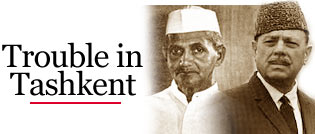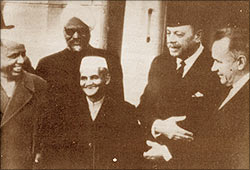The Rediff Special/ Kuldip Nayar

Kuldip Nayar, the veteran journalist and MP, worked closely with Prime Minister Lal Bahadur Shastri. He shares his memories of the Indo-Pak summit in Tashkent in January 1966 with Sheela Bhatt.
Lal Bahadur Shastri always believed we must have good relations with Pakistan. Besides, he believed they were our own people; after all, we are from the same stock, spoke the same language, etc.
Shortly, after he became prime minister, India and Pakistan clashed in Kutch. Shastri was always inclined towards peace, so he agreed to participate in the arbitration announced by then British prime minister Harold Wilson. At the same time, he issued a stern warning to Pakistan: "If you still want to fight, I shall hit you badly."
Zulfiqar Ali Bhutto, then Pakistan's foreign minister, had been told if Pakistan attacked India, it could win the war. Later, India would start building many more armament factories and become stronger. Bhutto sent infiltrators into Indian territory. Field Marshall Ayub Khan, who was then Pakistan's president, did not know about Bhutto's plan.
After the 1971 war, when I met Ayub Khan, I asked if I could speak to him about the 1965 war. He said, "Why talk to me? Talk to Bhutto. It was Bhutto's war."
It was sensational. The Pakistani plan was to cut off the road which connects India and the Kashmir Valley. I remember the army chief called Shastri at midnight. He sought an appointment. At that midnight meeting, army officers spread maps and showed Shastri how the Pakistani pressure was building up. They sought permission to relieve the pressure.
The prime minister asked, "Why don't you do that?" The commanders replied, "We should start another front to attract their forces on this side. This means we will have to move towards Lahore. But, that's an international border."
"The other is also an international border (Kashmir where the infiltrators had sneaked in)," Shastri said. "Cross it!" After Independence, this was the first time India had crossed an international border and the rest is history. We won the war. We hit their weaponry badly.
After the war, Alexei Kosygin, the Soviet premier, wrote to Shastri, 'Have pulao and the kababs of Tashkent.' Russia provided a forum. In a way, it was not a tripartite discussion.
I was then heading the United News of India. Before that I was Shastri's press officer, so I was quite close to him. Before leaving for Tashkent, Shastri hosted a small meeting of editors. He explained the background to the Tashkent talks and the agenda. He said the USSR is our friend and the issue is pending before the UN Security Council. All the editors agreed, but there was a major issue important to India.
We had won two posts. Haji Pir and Tithwa. Our army had captured these posts which were part of Pakistan occupied Kashmir. The editors argued that these two posts were very important because they overlooked Indian territory. Shastri said, "Yes, you have a point. I shall try." He wanted to talk to Pakistan because he had already shown India's superiority. Atal Bihari Vajpayee, who was then in the Jan Sangh, opposed the Tashkent talks.
Two plane loads of Indians went to Tashkent. Pakistan was enemy country so we flew over Iran to get there. Along with Shastri, there were Foreign Minister Sardar Swaran Singh, Defence Minister Y B Chavan, General P P Kumaramangalam, deputy chief of the army staff, many diplomats and journalists.
Shastri and Ayub Khan were given dachas almost 12 km away from the hotel where the respective delegations stayed. On the first day, they met alone. They agreed to the exchange of territory. Then, Shastri said, "We won't return Haji Pir and Tithwa which was won in the war." Pakistan said, "It's the result of aggression."
Shastri wanted a promise from Ayub Khan that Pakistan would never use force in the future. So the talks did not proceed. Kosygin was trying his best. But the difficult person was Bhutto. At one stage, Kosygin turned to Bhutto and asked, "Do you want to destroy your country?" Bhutto replied, "This would amount to surrender."

|
At the Tashkent summit: Y B Chavan, Swaran Singh, Shastri, Ayub Khan and Kosygin
| |
The talks used to be held late at night. At one point, Kosygin told Shastri, "You will have to give up Haji Pir and Tithwa." Shastri said, "In that case, you will have to talk to some other prime minister." The Soviets said the issue would go to the Security Council. Shastri said, "We may return them, but they must say specifically that whatever differences we have should not be sorted through war or violence, but only through negotiations." Ayub Khan agreed, but Bhutto opposed this.
Our Pakistani friends were packing their luggage. They were told it was all over. Then Kosygin intervened and a formula was
reached. Pakistan would say it would never resort to arms and India would return Haji Pir and Tithwa. When the last meeting took place Shastri did not find the specific reference to arms. Shastri showed his displeasure. Ayub Khan, at that very moment, wrote in his handwriting, "Without resort to arms." That document is still in the ministry of external affairs' archives.
After the settlement, Shastri met Indian journalists. Shastri explained the clauses of the agreement reached with Pakistan. Some journalists inquired about the two posts. He said, "Yes, but we have got this assurance." At that point, one journalist alleged, "You have sold the country." The press conference became quite bitter. Others joined in the criticism. I pacified them.
I went back to the hotel and retired early. I was dreaming about Shastri's death when someone knocked at the door.
"Your prime minister is dying," a fat lady said. I rushed to Shastri's dacha. As soon as I entered, I saw Kosygin speak to
somebody. In a large room, a small man's body was lying, crumbled. I could see he had struggled with the thermos.
We were informed that Shastri came in at 9.30 pm and called for a doctor. Later, Dr Chugh, his personal doctor, said, "Shastriji did not give me time."
Later, we discovered that Shastri spoke to his family in Delhi every day. That evening, he had called Delhi and asked for Ammaji, his wife Lalita. His daughter came on the line. It is said his daughter said, "Amma won't come on the line. You have given away Haji Pir and Tithwa." It is said she was very upset. Of course, former defence minister V K Krishna Menon and Vajpayee also criticized him. He then asked his daughter to send him all the newspapers to Afghanistan where he would halt for some time.
It is said he tried to reach Delhi again, but Ammaji never came on line.
It was around midnight. I used the hotline on which Kumarmangalam was speaking to someone in Delhi. When he hung up, I called the UNI office in Delhi. I dictated my biggest scoop, "Shastri dead." The journalist at the other end asked, "How is it possible sir? I am subbing his speech."
Late that night, Ayub Khan came to the dacha. He prayed. He told me, "If this man had lived, there was a possibility of India and Pakistan coming together to live in peace."
India honoured the Tashkent accord. But Pakistan never implemented it. Bhutto was against it.
There was a political tussle within Pakistan. And Tashkent failed.
Part II: The Errors of Simla
Part III: When Rajiv met Zia
The Rediff Specials